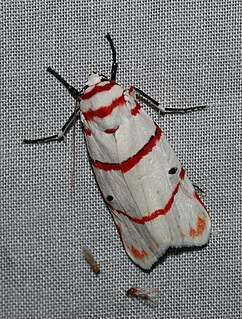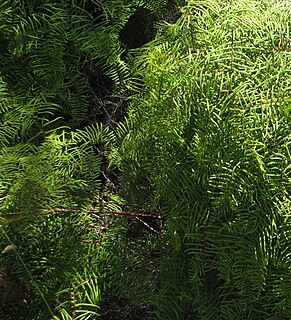
Cyana is a genus of moths in the family Erebidae. Species are well distributed in Africa, Madagascar, China, India, Sri Lanka, Myanmar, Sumatra, Java and Borneo. The genus was erected by Francis Walker in 1854.

Philine is a genus of sea slugs or sea snails, marine gastropod molluscs in the family Philinidae, the headshield slugs or paper bubbles.

Gleichenia is a genus of ferns. Its closest relative is the genus Stromatopteris, restricted to New Caledonia.

Adriana quadripartita, the bitter bush, is a shrub in the family Euphorbiaceae. The species, which is endemic to southern Australia, has an erect open habit, growing to between 0.5 and 3 metres or more high.

Cyana malayensis is a moth of the family Erebidae. It is found in Peninsular Malaysia, Borneo and Palawan.

The Collectio canonum quadripartita is an early medieval canon law collection, written around the year 850 in the ecclesiastical province of Reims. It consists of four books. The Quadripartita is an episcopal manual of canon and penitential law. It was a popular source for knowledge of penitential and canon law in France, England and Italy in the ninth and tenth centuries, notably influencing Regino's enormously important Libri duo de synodalibus causis. Even well into the thirteenth century the Quadripartita was being copied by scribes and quoted by canonists who were compiling their own collections of canon law.

Cyana puella is a moth of the family Erebidae. It is found in the north-western Himalayas, Nepal, India, Sri Lanka, Madagascar, Kenya and Eritrea.

The Iberian magpie is a bird in the crow family. It is 31–35 cm long and similar in overall shape to the Eurasian magpie but is more slender with proportionately smaller legs and bill. It belongs to the genus Cyanopica.

Cyana effracta is a moth of the family Erebidae first described by Francis Walker in 1854. It is found in Nepal, the north-eastern Himalayas, Taiwan, China, Burma, Peninsular Malaysia, Sumatra and Borneo.

Osyris quadripartita is commonly known as wild tea plant.
Cyana flammeostrigata is a moth in the family Erebidae. It was described by Timm Karisch in 2003. It is found in Cameroon, Equatorial Guinea, Kenya, Nigeria and Uganda.
Cyana margarethae is a moth of the family Erebidae. It was described by Sergius G. Kiriakoff in 1958. It is found in Kenya and Uganda.
Cyana pretoriae is a moth of the family Erebidae. It was described by William Lucas Distant in 1897. It is found in the Democratic Republic of the Congo, Kenya, Lesotho, Malawi, Mozambique, Somalia, South Africa, Tanzania, Uganda, Zambia and Zimbabwe.

Cyana propinqua is a moth of the family Erebidae. It was described by Alfred Ernest Wileman in 1910. It is found in Taiwan.
Cyana rejecta is a moth of the family Erebidae. It was described by Francis Walker in 1854. It is found in the Democratic Republic of the Congo, Ethiopia, Kenya, Malawi, Sierra Leone, South Africa, Tanzania, Gambia and Uganda.
Cyana straminea is a moth of the family Erebidae. It was described by George Hampson in 1914. It is found in Taiwan.

Cyana subalba is a moth of the family Erebidae. It was described by Alfred Ernest Wileman in 1910. It is found in Taiwan.
Cyana tegyra is a moth of the family Erebidae. It was described by Herbert Druce in 1899. It is found on New Guinea.
Cyana ugandana is a moth of the family Erebidae. It was described by Strand in 1912. It is found in the Democratic Republic of Congo, Ethiopia, Kenya and Uganda.
Cyana amabilis is a moth of the family Erebidae. It was described by Frederic Moore in 1877. It is found on the Andamans and Nicobar Islands.












